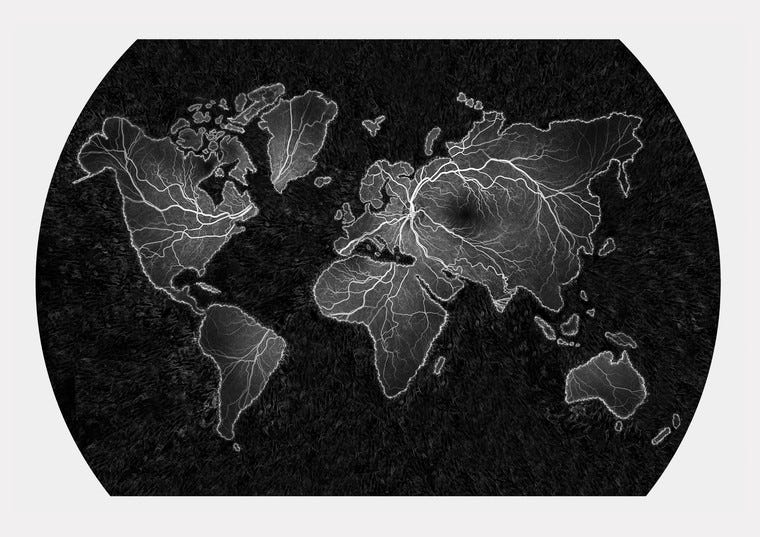[Although this post was written for practitioners of acupuncture and East Asian medicines working in the United States, I am posting it here in the hopes of inviting historians, anthropologists, and others working on related topics into this active conversation.]
A movement is afoot to replace the word "oriental" in AOM schools and organizations. How much do practitioners wish to engage in the work of examining Orientalism within our field - self and public perceptions - along with changing its presently Orientali
Orientations:
Beginning in the wake of the protests memorializing George Floyd, Breonna Taylor, and too many others in summer 2020, two movements began to address a related issue of racism within our own scholarly and professional field. At the grassroots level, Influential Point launched a petition and campaign requesting that the U.S. acupuncture and oriental medicine (AOM) community remove this racist word from our professional discourse. At the administrative level, Dr. David Lee, the Academic Vice President of Alhambra Medical University in California, initiated a campaign among his peers to “repeal and replace” the word “oriental,” school by school, in school names and degree titles, with the goal of carrying this momentum forward into pressuring ACAOM and NCCAOM to do the same. Collectively, it would seem, the moment has come for making long-overdue, necessary change.
But after determining to not use this word, what other word should we use? And more importantly, how do we make that choice? How might we, the professionals impacted by the name and public face of our craft get a say in making it? If practitioners wish to have a voice in the decision about how we redefine the AOM profession to patients and our broader communities, step one is educating ourselves about the pros and cons of commonly proposed alternative names.
This list of terms, and breakdown of some of their more salient associated issues, is by no means exhaustive. This paper presents a starting point for opening an informed discussion based on something other than personal opinions. It is further my hope that it will help readers cultivate an appreciation for the many different filters through which different people can see the world, let alone a single word. For this reason, each term needs to be looked at from many possible perspectives. One person’s opinion is not going to decide this for us. Nor should it.
I am a clinician, philologically trained translator of classical Chinese, and historian-in-training. This is to say that I have spent countless hours researching and thinking closely about exactly what a word means, or what is the best way to translate X concept into Y language, or for Z type of audience. At the most fundamental level, any alternative would be better than the deeply embarrassing, racist word that we currently use. That said, how we choose our marginally better word matters, too. It is an opportunity not only for learning and self-reflection about the word “oriental” that we seek to replace. It is also an opportunity to recognize some of the many ways in which our field is Orientalist - perpetuating a reified notion of an exotic, but ultimately undifferentiated or falsely uniform, "alternative" or "other-than” medical culture.

How much do we wish to engage in the work of examining Orientalism within our field - self and public perceptions - along with changing its presently Orientalist name?
To change the broader dynamics (removing Orientalism), rather than only the most visible external manifestation of those dynamics (removing only the word oriental), are two separate things. In my opinion, we should not neglect the former opportunity in our rush to correct the latter problem. The work of examining the Orientalism that permeates our field is important work because it can help us to clearly define and create a professional community. At present, the AOM field in the United States, with its crazy-quilt patchwork of organizations, state practice scopes, regulatory agendas, and heterogeneity of training, entirely lacks professional cohesion. Such fragmentation prevents us from standing united against threats to our scope of practice, such as dry-needling, let alone advocating more strongly for our potential role as first point of contact providers of healthcare in a country desperately in need of primary care providers.
How might we use the process of reflecting on replacement terms as a kind of professional praxis, forcing us to confront the ways in which words matter because words connote as well as denote, delimit, and define?
The idea that the name or definition of something matters - that a name should accord well with the thing it names - is not a new or radical one. Rather, we know that Confucius himself advocated for the “Rectification of Names," warning against the confusion and social unmooring created by the drift between signs (names) and the things they signify. As we come together as a collective in exploring the full context of each possible term, we are also forced to open a conversation about what values undergird our selection strategy. Naming ourselves presents an opportunity to better define the dynamics of our profession as a whole, our individual positioning within these dynamics, and a collective re-envisioning of how we wish to define ourselves and our practice.


